Adaptogens and their Benefits
This post may contain affiliate links. View our disclosure policy here.
It is utterly amazing how adaptogens and their benefits can have such a strong impact on your overall wellness. Adaptogens are a category of items that definitely deserve a spot in your wellness basket!
What Are Adaptogens?
In general, adaptogens are plants that contain constituents which help your body respond better to physical and emotional stress, anxiety, and fatigue and bring your body to balance, physically and mentally. Adaptogens have been used in various traditional medicine approaches for centuries and seem to be becoming more prevalent among those seeking more holistic medicine approaches today.
Dr. Nikolai Lazarev started researching chemical compounds that could help decrease the negative effects of acute and chronic stress in 1946. By 1957 he had introduced the concept of apoptogenic herbs. They, of course, have been around since creation, but it was Dr. Lazarev who grouped them together with the name of adaptogens.
A more formal definition with specific criteria was developed in 1968 by Russian researchers Israel I. Brekhman and I.V. Dardymov. Brekhman and Dardymov believed that adaptogens work by restoring homeostasis (in other words, the body’s natural balance) in the face of stress, and that they can help our bodies adapt to a wide range of stressors without causing harm or disrupting your normal physiological function.
They also noted that adaptogens must meet certain criteria, including being non-toxic, non-habit-forming, and non-specific in their effects. Additionally, they must have a normalizing effect on the body, meaning that they can help bring various physiological systems back into balance for you.
Brekhman and Dardymov studied a number of herbs (plants). These included eleuthero (Siberian ginseng), schisandra, rhodiola rosea, and ashwagandha, among others, identifying them as adaptogens based on their ability to meet these criteria. It was their work that laid the foundation for modern research into adaptogens, and their definition/criteria of the term continues to be widely used today.
What Are The Benefits of Adaptogens?
Adaptogens are thought to work by regulating your body’s response to stress by modulating the hypothalamic-pituitary-adrenal (HPA) axis, the sympathetic nervous system, and the immune system. They are also believed to enhance overall physical and mental performance, improve mood, increase endurance, and promote longevity. An incredible assortment of benefits! Let’s talk about these a bit more.
Adaptogens help your body better deal with stress.
Your body has a system called the HPA axis, which is kind of like a communication network between different parts of the body. When you’re undergoing stress, the HPA axis can get out of balance and cause all kinds of problems, like making us feel anxious or tired. Adaptogens help regulate the HPA axis, which means they help keep it in balance and assist in preventing it from causing problems. They also work with the sympathetic nervous system, which is the part of our body that controls our “fight or flight” response to stress.
Lastly, adaptogens can also help your immune system, which is the part of your body that fights off things it sees as invaders and helps maintain health. When we’re stressed, our immune system can get weaker, but adaptogens can help strengthen it and keep us from getting sick.
So, in short, adaptogens help your bodies deal with stress by keeping different parts of your body in balance and working together. They may also help alleviate anxiety, reduce fatigue and sometimes increase energy, and assist in coping with various types of trauma.
Working with Adaptogens
Adaptogenic Herbs
The following is a list of herbs considered to be adaptogens. This list is not all inclusive and is provided for educational purposes. While I will cover a few in a little more detail below, I encourage you to learn more about these herbs, its individual benefits as well as herbal constitutions before making decisions which ones may be best for you.
- Ashwagandha
- Astragalus
- Codonopsis
- Cordyceps Mushroom
- Eleuthero
- Holy Basil
- Jiaogulan
- Licorice
- Maca
- Panax Ginseng (aka Asian Ginseng)
- Reishi Mushrooms
- Rhodiola Rosea
- Schisandra
- Siberian Ginseng
- Turmeric
My Favorites
I’ll admit it. My favorites are the ones I know the most about and have worked with. These adaptogens and their benefits are amazing to me. Some of these things on this list I have heard of, but really don’t know that well and have not had experience with them. So I listed them here, because they are included in a lot of the sources I have and would like to learn more about. In the meantime, you can learn about them on your own as well if you would like. I didn’t want to NOT include them. That’s not fair to the herb! Or you. It may be the one you need.
Ashwagandha
Got a full stress bucket? This one may be what you need.
Ashwagandha (Withania somnifera) is a small shrub native to India and northern Africa and parts of the Middle East. Ashwagandha is best known for its stress and sleep benefits. From my reading, it seems to be used primarily in extract or powder form, but it can be certainly used in a decoction which is basically a long hot tea infusion. As the part that is used is the root, a simple steep as teas are usually made is not the best way to get the optimal benefits.
The benefits of Ashwagandha, as is the case for most herbs, are numerous. They include the stress and sleep benefits as I mentioned (also my primary reason for working with Ashwagandha in tincture form most days), as well as reduction of inflammation, improving insulin sensitivity and blood sugar regulation, and alleviating seasonal depression. Many people have worked with Ashwagandha for ADD/ADHD, Hypothyroidism, menopause, and PMS.
As I mentioned, my primary mode of working with Ashwagandha these days is with a tincture. I take a dropperful in the morning and a half of one in the early afternoon. Sometimes I do add a half a teaspoon of powder to my morning cup of coffee.
Holy Basil
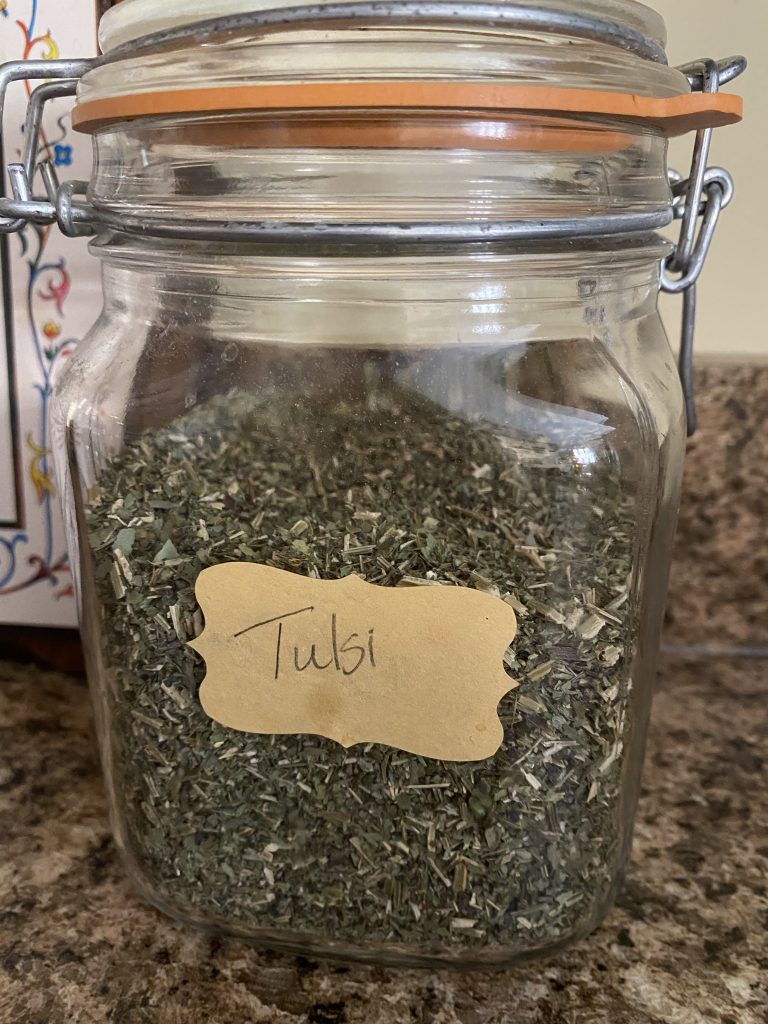
Holy Basil/Tulsi (Ocimum sanctum) is a favorite of mine. A relative of the common culinary herb, it contains a number of chemical compounds thought to be adaptogenic. Holy Basil is said to be anti-inflammatory, pain reducing, stress reducing and more. People have been known to work with Holy Basil for ADD/ADHD, anxiety, depression, headaches, fever and more.
Making a tea blend is one of the first things I do each morning as part of my morning routine. I fill a tea basket inside of a mason jar of various herbs and one of them is usually tulsi. I have worked with tinctures of tulsi as well and have an adaptogenic herb blend supplement that my functional medicine doctor recommends when I’m under stress.
Check out my post on Tulsi to learn more about this terrific herb!
Schisandra
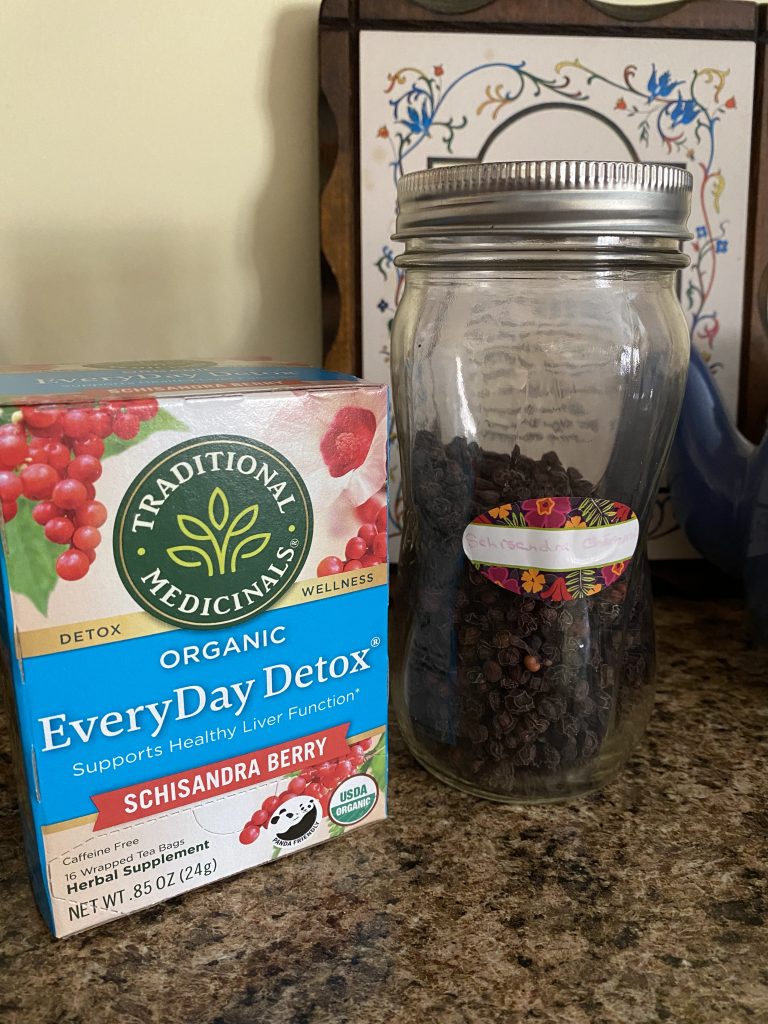
I make good use of Schisandra when I’m doing a Whole30 or trying to reduce my sugar intake. It’s a lovely after dinner tea. Some people actually chew on the berries though they are pretty tart in addition to the sweetness they give a tea. It’s often referred to as the 5-flavor fruit (sweet, sour, bitter, pungent and salty).
Schisandra seems to have significant effects on the nervous, immune, and endocrine systems. Known as a calming adaptogen. It enhances reflexes and work performance. It can also increase alertness and mental activity. Schisandra can help the body get rid of free radicals and lessen oxidative stress.
I generally always have the Traditional Medicinal teabags on hand- they are nice when I am traveling. But I also have the dried berries in a jar that I can toss into whatever herbal blend I am making in the morning.
Turmeric
Turmeric seems to be quite popular these days. This is primarily due to it’s anti-inflammatory response and pain relief. I have this formula in my own medicine cabinet which I take for the seldom headache or other pain.
Turmeric is often considered an adaptogen because it has been found to help the body cope with stress and adapt to changes in the environment. Apparently turmeric may be helpful at reducing depression symptoms due to the way that curcumin impacts neurotransmitter function through the brain-derived neurotrophic factor.
Turmeric contains an active ingredient called curcumin, which has been shown to have anti-inflammatory and antioxidant properties. These properties may help reduce inflammation in the body, which can be a result of stress and can contribute to a range of health problems.
How To Work With Adaptogens
There are various ways to work with adaptogens. First, and most commonly, it seems, are there are supplement capsules. There’s a broad spectrum of supplements on the market that contain single or combined adaptogenic herbs.
Second, and also quite common, tinctures are substances which use some type of alcohol or glycerin type menstruum to extract the herbs and retain the constituents.
Third, adaptogens can be added to foods. I often add Reishi mushrooms to my bone broth as it simmers.
Teas are another popular form. As many of these adaptogens are roots, a long decoction for tea is better than a short steep.
Lastly, there are powdered forms of adaptogens. They are best if used right away but are not, according to my sources, the best way to work with the herbs for optimal benefits. I have been known to add just a little powdered Ashwagandha to my coffee blend from time to time. This is in addition to my daily tincture when I feel I need a little extra help with sleep.
I imagine there are other ways to work with adaptogens such as vinegars or oils. Personally, I just do not , at this time, have experience with using these types of products with adaptogens yet. I have, however, infused basil in my honey so I’m sure you could do that with some fresh tulsi!
Side Effects & Cautions
It’s important to know about adaptogens and their benefits as well as being cautionary with new herbs you want to work with.
Adaptogens are generally well tolerated by most. But as with any herb, supplement or medication, anyone can have an adverse reaction depending on their individual constitution, allergies, and other medical conditions. Additionally, please research any herb (or supplement or medication or food) you choose to attempt working with and determine if it is right for you. I would suggest speaking with a professional herbalist or functional medicine professional.
It is important to completely understand the herb you are working with and how it may affect your body. Some adaptogens can actually increase energy and would not be a good option to take in the evening. Some may not be a good combination with certain medications. It’s important to learn all about the particular herb you choose before experimenting.
Best Resources to Learn More
Check Out These Books at the Library or Purchase on Amazon!
Adaptogens: Herbs for Strength, Stamina, and Stress Relief by David Winston, RH(AHG)
Herbs For Stress & Anxiety by Rosemary Gladstar
Healing Adaptogens: The Definitive Guide to Using Super Herbs and Mushrooms For Your Body’s Restoration, Defense and Performance by Tero Isokauppila and Danielle Ryan Broida
Herbalism Courses
CommonWealth Holistic Herbalism
The School of Christian Herbalism
Easy Tea Formulas and Tinctures to Help YOU Get Started!
Here’s some Amazon links to help you get started quickly!
Organic India Tulsi Ashwagandha Teabags
Organic India Tulsi Chamomile Teabags
Herb Pharm Holy Basil Tincture
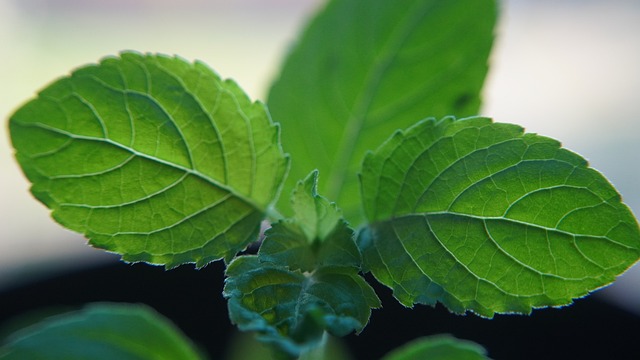



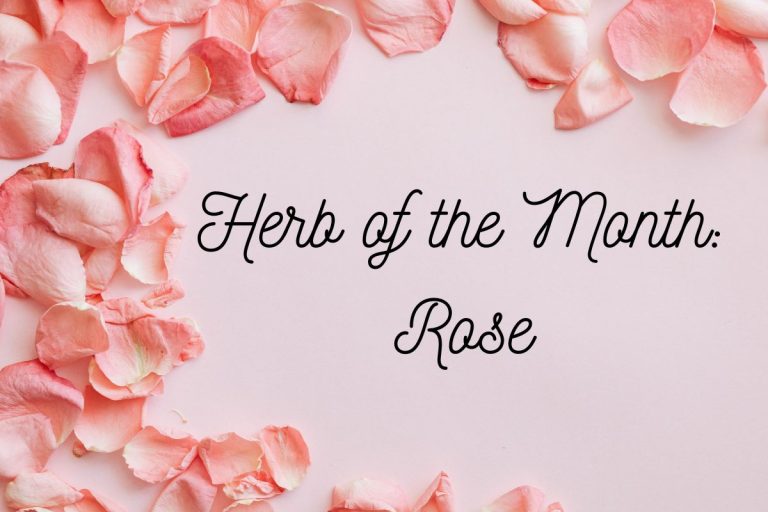


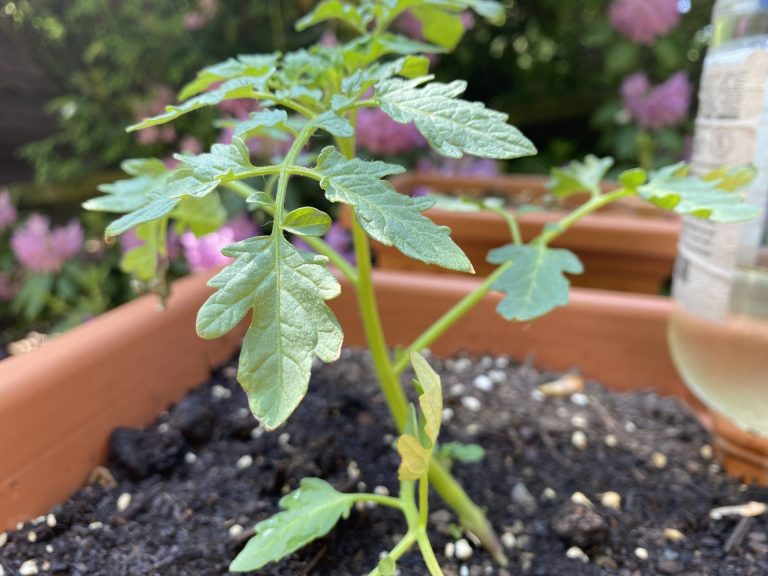
Thank you for sharing, I love so many of these. I always say if I was forced to only choose one thing it would be ashwagandha but I rotate a few. I grew some last year and I’m taking a stab at Rhodiola right now. My turmeric ginger tincture is also a lifesaver for my joints. Love this post!
Thanks so much. Ah yes, Ashwagandha is amazing! I love how much these plants provide for us! I have not worked with Rhodiola yet. It’s on my list to hopefully try out soon.